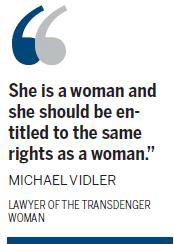Society
Transgender woman's marriage blocked by HK court
By Timothy Chui (China Daily)
Updated: 2010-08-10 08:09
 |
Large Medium Small |
HONG KONG - A test of wills is underway between a local government seeking to uphold tradition and a couple earnestly pursuing what some might say is anything but against a landscape with some bizarre circumstances.
The woman, a local resident in her 20s who, under court order can be only identified as "W", was born male and has been undergoing sex-change surgery, but been blocked from marrying her boyfriend by Hong Kong's marriage registry, according to her attorney, Michael Vidler.
"She is a woman and she should be entitled to the same rights as a woman," Vidler said.
In this particular case, according to Vidler and others, however, the devil may lie in many details.

Under current laws, a post-operative female transsexual living in Hong Kong is lawfully entitled to marry, but only to a woman - despite the fact that same-sex marriages are prohibited in Hong Kong.
Vidler said the application by W to marry her male partner was rejected by the marriage registry based on the fact that her birth certificate listed her as male.
The origins of the impasse date five years back when W first began to undergo sex change surgery and therapy, which she recently, and successfully, completed.
In fact, the Hong Kong government officially recognized the procedure, authorizing the change in her identity card and school certificates.
W and her boyfriend then submitted a marriage application that was rejected out of hand by the Hong Kong marriage registry - based on the gender listed on her birth certificate, Vidler said.
This case in a place that bans same-sex marriages, noted Vidler, offers no shortage of irony.
"We're not looking for her to marry another woman. She wants to assert her right to marry a male partner", he said. "We're not suggesting same sex marriage."
Senior counsel Philip Dykes, arguing in defense of W, said interpretations by the court of male and female in the Marriage Ordinance needed to encompass societal developments.
Dykes submitted that the court reviews the term "female" in the context of the Marriage Ordinance, while including the term "post-operative transsexual woman" - or, alternatively, to find the Marriage Ordinance in breach of the right to marry as enshrined in the Basic Law, the city's de facto constitution.
Should the ordinance be found in violation of the Basic Law, the court will make a declaration and suspend the matter while lawmakers address the issue, a process that could take years, as has happened in similar cases in the UK, Dykes said.
Dykes also pointed out that the relevant section under the Basic Law was itself ambiguous. It read, "The freedom of marriage of Hong Kong residents and their right to raise a family freely, shall be protected by law."
"W feels, lives, believes, behaves and has her body attuned as a woman - but most importantly, she is a woman psychologically", he said, adding that W's transformation is irreversible.
Dykes further cited a list of Common Law precedents for such marital unions, including practices in Japan, South Korea, Singapore and Indonesia - as well as on the Chinese mainland. In addition, most European countries and several US states also permit such marriages.
Queen's Counsel Monica Carss-Frisk, speaking for the government, said that "the court is being asked to legislate rather than interpret," adding the original intentions behind the marriage law drafts should be kept in mind when reinterpreting terms for contemporary times.
There also existed difficulties in interpretation, she added, especially when deciding where to draw the line. If the door was opened for post-operative transsexual women, said Carss-Frisk, what about pre-operative transsexuals or others living like women who were not born women.
Given that there is a substantial link between marriage and procreation, she said, it was up to government to preserve that link.
"There are far-reaching implications to a raft of issues such as inheritance and children", she said. "There is no evidence that contemporary use of the words man and woman encompass the transgendered."
Carrs-Frisk was only able to complete only half of her presentation prior to today's adjournment.
The second day of this case continues on Tuesday at the High Court.



